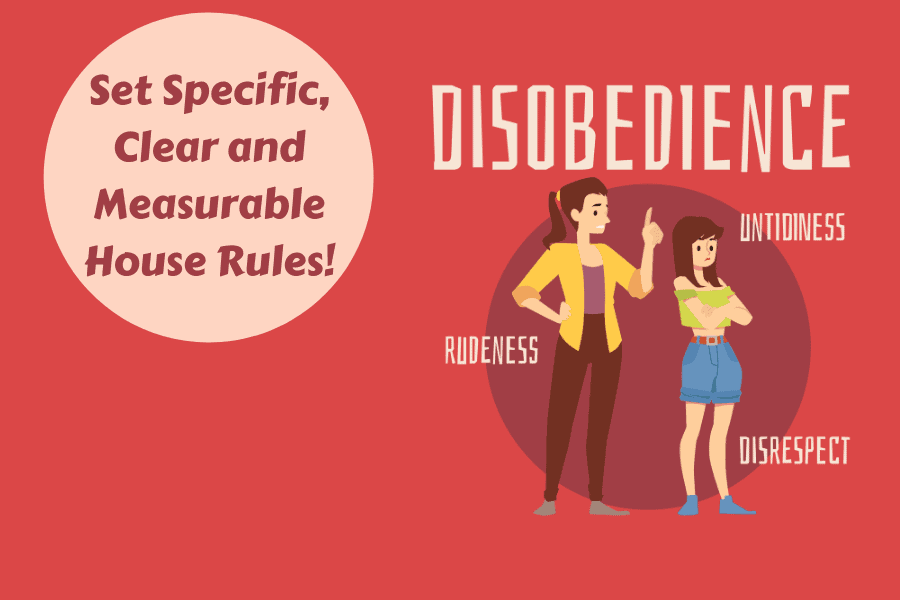This post may contain affiliate links which means I may receive a commission from purchases made through links. I will only recommend products I have personally used. Thanks.
Teenagers pushing boundaries is a common challenge that most parents face. Going through the toddler phase with my kids, I always looked forward to when they would become teenagers and more independent. What I did not realize at the time was that adolescence comes with challenges. Nonetheless, raising a teenager is an exciting stage for both parents and teens. Adolescence consists of a significant period of growth and identity development unlike any other. Voice deepening, feminine, & masculine features, facial hair growth, and other puberty signs appear. These are all signs that your child is beginning to transition into the next stage in their development. We also ought to recognize that psychological and behavioral responses to these rapid changes would emerge during this short phase of time.
As part of growing up and becoming self-directed, most teenagers want to test out independent ideas and unique behaviors. Sometimes this involves disagreeing with you, or giving you a bit of an attitude. You may also find that your teenage child may mimic behaviors learned from friends. Don’t be surprised if they start to push boundaries or challenge the status quo both at home and outside.
Although it can be hard for you, these are all normal and essential aspects of adolescence. And with time, this phase will pass.
Teenagers Pushing Boundaries – A Sign of Positive Development
While you might be getting somewhat disillusioned by your teenage child’s behavior and want to instill discipline or curb those rebellious conducts once and for all, know that it is a sign of the positive advancement in your child’s character.
As your teenager grows, they develop certain personality traits and realize that they no longer need to follow your orders. They can now do what they want. While it is a little irritating, knowing that it is a normal and positive development for your teen is equally reassuring. By asserting themselves despite your irritation, it shows that they have great potential and interest in following their dreams and doing what they want. Therefore, it is crucial to appreciate this phase in your child’s development.
Let’s not forget that it is also the time to make them aware that house rules and laws must be adhered to at home and in the wider society. Teaching your teenage child these essential life skills and discipline will prepare them to embrace a purposeful life.
Why Do Parents Need to Set Safe Boundaries
Effective boundaries will leave a significant impact on your teen’s character. It will also help you to reduce conflicts with your teenager. The setting of limits is a fundamental part of a balanced parenting style. And this type of parenting for teenagers leads to many positive improvements like better grades, less drinking and drug use, and safer driving.
By setting rules for teenagers and keeping firm boundaries, you will teach your teens that they have responsibilities. For example, having defined house rules for teenagers will provide them with some structure.

Simply having house rules without clear consequences for what will happen when those rules are violated is not effective. Therefore, you will need to set house rules for your teens and also clarify the practical implications for them should they disregard the rules. By being clear on your house rules and related consequences, your teenager will understand that their actions have effects.
It is equally vital to ensure that your teens understand that you are making rules because you love and care for them. You trust them but are worried about their safety. If your teens feel more secure because of the rules, they may accept challenges with more confidence. Similarly, it’s essential to admit that our children are growing up. When we loosen the reins little by little, we help them become more independent day by day.
In this article, I will explore 10 essential things to consider while dealing with teenagers pushing boundaries.
1. Start with Love
Start with something positive before you even discuss house rules or boundaries with your teens. It would be best if you told them how much you care about them and their well-being.
Also, discuss something they have done to make you proud. Be clear on how much you love them. Let them know that the main reason for setting boundaries and house rules is to keep them safe.
Explain that your house rules or boundaries are not intended to be punitive or ruin a good time. Also remind them that you are on their side whatever situation they may find themselves in.
By approaching the subject of ‘teenage house rules and boundaries’ on a positive note, they are likely to pay more attention. Starting from a place of care and love will also help them understand that you have their best interest at heart. Make them to understand that this is not about controlling them. Remember, the one thing your teen resents at this stage is control.
2. Maintain Empathy
It would be best if you remembered how it was growing up as a teenager. If you were born in the ’70s, ’80s, or ’90s, you would agree that growing up under a more conservative and stricter parental regime was tough.
Nonetheless, we should acknowledge that our teens have their fair share of troubles. According to the American Psychological Association’s research, teens today are even more stressed than adults.
If you find it difficult to understand why your teen is pushing boundaries, just remember how it was when you were their age.
You should show empathy and be open about your struggles and mistakes as a teenager. You can make statements like, “I remember feeling that way in my teenage years”, “or “I made some not so cool choices, and I remember how that was.” In difficult times, teens want to know that someone understands them. Please do not blame your teenage child when they make mistakes but encourage them to reflect on their actions and consequences.
In relatively bad situations when a teenager is being difficult, show affection by not over-reacting. You should respond with a smile rather than a frown. It would help if you stayed above the din.
Also, do not tell a teenager what to do in trivial matters. Instead, you can initiate a conversation that will enable them to explore their options. Being prescriptive on trivial issues will cause them to think that you do not trust their judgment. Likewise, they may assume that you do not trust that they are capable of using their own initiative.
When a teenager starts to push boundaries, you should not get angry, irritated, or anxious. You should give yourself some distance, take a deep breath, and allow them the space to reflect on their conduct. By adopting these good parenting skills, you can handle challenging situations much better.
3. Avoid Giving Away Your Power
One of the most common behaviors of difficult teenagers is that they want to push your buttons and make you react angrily. They tend to do this in various ways, including teasing, disobeying, not listening, back-talking, temper throwing, rule-breaking, dismissing, haggling, and provoking.
You should maintain a calm disposition during these difficult moments. The more aggressive and upset you become, the more your teenager will think that they have power over you. Also, they will feel that they have succeeded in pushing your buttons by breaking the boundaries and rules you have put in place.

When you face a teenager pushing boundaries, the first rule of thumb is to keep your cool. When you feel irritated or challenged by a teen, before you get angry or do something that may worsen the situation, take a deep breath, or walk away. Taking a break from the situation would allow you time to regain your composure and figure out a better solution to the problem. In this way, you can reduce, instead of exacerbating, the problem.
4. Utilize Assertive and Effective Communication
“The art of communication is the language of leadership.” This statement is applicable when it comes to working with and motivating teenagers who are pushing boundaries. When facing a difficult young person, you should defend your position by using effective communication skills.
Improving your communication strategy will also help you learn how to decrease teenage resistance and increase cooperation with them.
5. Establish the Difference between Privileges and Rights
Your children have rights to food, clothing, and shelter. It would help if you never held these things back as a consequence of their unruly behavior. There are no rights to staying out late, cell phones, use of a car, etc. Those are privileges that can be withheld if they act up.
Generally, it is more effective to withhold something closely related to the issue at hand. For example, if you find your daughter spending too much time on social media, it would be reasonable not to allow cell phone use until she finishes her homework. If she breaks that rule consistently, it may be prudent to take away her cell phone as a consequence, until you both agree on a way forward. Similarly, it will be disproportionate and unfair to tell your daughter that she can’t use the family car in these circumstances.
6. Allow for Natural Consequences
When dealing with teenagers pushing boundaries, you should avoid power struggles. If you allow your teen to face the natural consequences of their choices, it will benefit their character development. Natural consequences are the natural results of a choice, action, or omission. For example, if your teen gets into a fender bender, the natural consequences are that insurance coverage goes up.
Also, there will be a cost for the repairs, and steps will need to be taken to get the repairs done. While it may be challenging, it would be best if you allow your teen the opportunity to figure out how to solve these issues. By resolving this problem themselves, it will give them the chance to learn a complex but essential lesson about taking responsibility for their actions.
It is crucial to offer guidance and empathy in these situations but avoid assuming responsibility for these problems or bailing them out. By taking a back seat, you create an avenue for them to assert themselves and develop their problem-solving skills. Also, this will help them to develop an understanding of cause and effect.
7. Be Firm and Consistent
We have established that teenagers pushing boundaries is a common phenomenon. Notwithstanding, you have to provide security and safety for your teens. You also have to incorporate firm rules for teenagers and clear boundaries as part of your parenting approach.
In difficult situations, your ability to remain consistent earns you respect. Therefore, you must set clear boundaries in your own life to enable you to model boundaries for your teen. You should establish your relationship boundaries with your teens. In so doing, they would be clear on what you deem to be acceptable and what is not.
As we know, most teenagers want to feel greater independence and autonomy. Likewise, some teenagers will inevitably challenge you in order to test the range of their power. In these challenging situations, it is essential to maintain boundaries. In so doing, you will be able to achieve a workable and healthy relationship with your teen.
When setting boundaries or rules for a teenager, you need to be clear and specific. The most effective boundaries are fair, reasonable, and can be applied consistently in your teen’s daily life or when appropriate.
If you have found yourself dealing with your teen’s challenging behavior like most parents, it would be helpful to review the cause of the problems.
The next step would be to ensure that there are clear boundaries or house rules in place. Please also make sure that you have made your teen aware of the rules or boundaries you have set for them. Be clear on the consequences or implications for not following the rules.
Try as much as possible to communicate with your teen when there are no altercations or disputes. Discussing teenage house rules at an appropriate time will facilitate your teen’s cooperation and engagement.
Always remember that discussing boundaries after breaches have occurred is less effective.
8. Practice What You Preach
If you want to show your teens how possible it is to live within boundaries in their lives, you should live an exemplary life.
Effective parenting with actual practice can help your teen to understand limitations and the concept of ‘the rule of law’. Even though it’s sometimes difficult to drive within legal speed limits when you are in a rush, the rules are in place for your safety and that of other road users. So, non-compliance is unlawful and has far-reaching ramifications. So you must adhere to the rules. If it means that you get home later than expected, your family knows where you are and how they can contact you.
Similarly, if parents live within reasonable boundaries, their teens are more likely to accept rules set for them with very little resistance.
9. Give Respect to Earn Respect
It is essential to know that if you want your teens to be respectful, they must see respect in your interactions with others and feel respected.
It would be best if you understood that although your teens may seem dramatic or make bad choices at times, teens are doing their best to figure out relationships and become an adult.
In many cases, if your teen does not feel that you respect them, they will model your behavior, and the impact of this is never desirable. If they feel respected even when you are in disagreement with their choices, they are likely to adopt the same level of respect in their relationships.
Your teens may be intelligent and independent, but they still need you in their life. Despite the arguments and their defiance, you are still their parent. And you are still responsible for keeping them safe, meeting their basic needs, and helping them to become sensible adults. They need to understand that you love them unconditionally and that you are on their side no matter what.
10. Respect & Maintain Your Teen’s Privacy
All teens need their own space and privacy. Although teenagers are known for pushing boundaries, this does not entitle you to dismiss their privacy rights.
Going through their journals, cell phones, or personal belongings is not usually a healthy idea, except there are safety issues or concerns.
Your teens need to have their own identity and appropriate boundaries with space to learn. You can always be proactive and set rules in advance, such as limiting internet time and putting appropriate parental control on their devices. You may also check your teen’s online posts periodically.
However, you should keep in mind that if they wish to break the rules, they will always find a way, no matter how much you invade their privacy.
Final Thoughts
Raising teenagers can be very difficult and exciting at the same time. Living with a teen can make any parent confront their own behaviors and personal boundaries at times.

It is essential to allow yourself the freedom to make mistakes and learn along with your teens. In doing so, you will develop a healthy relationship with your teens and raise them to become healthy, responsible adults.
I am a mother of 4 adorable children, 2 of whom are now teenagers. Like most parents, I have dealt with my own fair share of teenage defiance. Having clear and specific house rules have been very helpful in enabling me to parent my teenage children.
Let’s be realistic, despite our best endeavors in dealing with teenagers pushing boundaries, we cannot eliminate this phase. But with love, empathy, and effective communication, we can work through the complex paths and overcome the many challenges that adolescence presents.
Please do not forget to share this article with other parents who may be concerned about ‘Teenagers Pushing Boundaries’. You never know, others may also find it useful.
Good luck.
Related Posts
- 5 Effective Ways to Handle Separation Anxiety in Toddler Age 3 and above
Separation anxiety in toddler age 3 and those younger is a phase in your child's development.…
- 7 Important Signs Your Toddler Is Not Autistic
What are the signs your toddler is not autistic? Well, it is a commonly asked…
- 7 Simple Ways to Stop a Toddler Hitting Parents
The case of a toddler hitting parents is understandably concerning. Worse still is the fear…
- 9 Effective Ways to Handle Toddler Aggression
Do you constantly deal with toddler aggression, including willful disobedience, howling, physical aggression, and verbal…
- Best Style of Parenting & 7 Essential Tips to Improve Your Parenting Style
Like millions of other parents, you’re probably wondering what’s the best style of parenting to…







